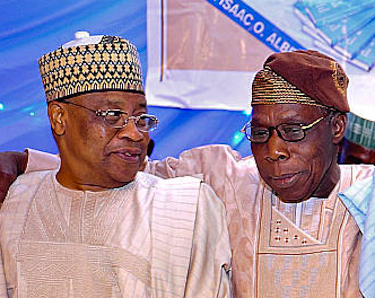After marathon meetings on Friday with all the warring factions of the Peoples’ Democratic Party (PDP), the Elders’ Committee has prepared a five-point action plan for onward presentation to President Goodluck Jonathan on how to resolve the crises.
The committee, which was led by former President Olusegun Obasanjo and included former military leader, General Ibrahim Babangida, and the Chairman of the Board of Trustees (BoT) of the party, Chief Tony Anenih, had, on Saturday, wrapped up the five-point action plan, which it believes would aid President Jonathan in resolving the logjam in the party.
According to sources privy to the recommendations, they include the reinstatement of the Adamawa State chapter of the party loyal to Governor Murtala Nyako, reinstatement of the executive committee of the Rivers State chapter of the PDP which is loyal to Governor Amaechi, as well as the re-absorption of Governor Rotimi Amaechi into the party in line with the party’s constitution.
The sources also disclosed that the elders committee recommended that President Jonathan should intervene and bring an end to the crisis rocking the Nigerian Governors’ Forum (NGF) by calling a heart-to-heart meeting with the Plateau State governor, Jonah Jang, and his Rivers State counterpart, Amaechi, to agree on a resolution of the crisis.
Another recommendation of the elders committee, which is to be submitted to the president, is the suggestion that the 31 August mini convention should be reviewed to rectify any anomalies.
Former President Obasanjo has been mandated by his fellow elders to get the recommendations to President Jonathan.
Meanwhile, a source said that the issue of Jonathan’s ambition in 2015 was not raised by the aggrieved G7 governors, whose faction is now led by Alhaji Baraje.
The source said: “The meeting went well with each party restating its position as stated at the meeting with President Jonathan on September 1.
“The G7 governors insisted on stoppage of the probe of the states by the Economic and Financial Crimes Commission (EFCC) and a closer relationship between them and the president. They insisted that a situation where some persons appear to be appropriating the president to themselves, while some governors have limited access, is uncomfortable.
“They believe that some governors have always had their nominees appointed into positions, while others have none, especially the case of Kano governor who had complained during the meeting with the president.”
It was further gathered that the Abuja meeting of Friday did not deviate from the facts stated at the Villa meeting on 1 September. Issues raised included those of stoppage of EFCC probes, restructuring of the party, that of Alhaji Tukur becoming difficult to work with, the NGF crisis and the issue of federal appointments for candidates of some governors.

